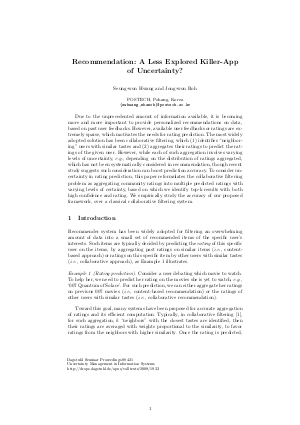Recommendation: A Less Explored Killer-App of Uncertainty?
Authors Seung-won Hwang, Jong-won Roh
-
Part of:
Volume:
Dagstuhl Seminar Proceedings, Volume 8421
Part of: Series: Dagstuhl Seminar Proceedings (DagSemProc) - License:
 Creative Commons Attribution 4.0 International license
Creative Commons Attribution 4.0 International license
- Publication Date: 2009-03-24
File

PDF
DagSemProc.08421.11.pdf
- Filesize: 175 kB
- 6 pages
Document Identifiers
Subject Classification
Keywords
- Recommendation
- uncertainty
Metrics
- Access Statistics
-
Total Accesses (updated on a weekly basis)
0Document
0Metadata
Abstract
Due to the unprecedented amount of information available, it is becoming more and more important to provide personalized recommendations on data, based on past user feedbacks. However, available user feedbacks or ratings are extremely sparse, which motivates the needs for rating prediction. The most widely adopted solution has been collaborative filtering, which (1) identifies "neighboring" users with similar tastes and (2) aggregates their ratings to predict the ratings of the given user. However, while each of such aggregation involves varying levels of uncertainty, e.g., depending on the distribution of ratings aggregated, which has not been systematically considered in recommendation, though recent study suggests such consideration can boost prediction accuracy. To consider uncertainty in rating prediction, this paper reformulates the collaborative filtering problem as aggregating community ratings into multiple predicted ratings with varying levels of certainty, based on which we identify top-k results with both high confidence and rating. We empirically study the efficiency and accuracy of our proposed framework, over a classical collaborative filtering system.
Cite As Get BibTex
Seung-won Hwang and Jong-won Roh. Recommendation: A Less Explored Killer-App of Uncertainty?. In Uncertainty Management in Information Systems. Dagstuhl Seminar Proceedings, Volume 8421, pp. 1-6, Schloss Dagstuhl – Leibniz-Zentrum für Informatik (2009)
https://doi.org/10.4230/DagSemProc.08421.11
BibTex
@InProceedings{hwang_et_al:DagSemProc.08421.11,
author = {Hwang, Seung-won and Roh, Jong-won},
title = {{Recommendation: A Less Explored Killer-App of Uncertainty?}},
booktitle = {Uncertainty Management in Information Systems},
pages = {1--6},
series = {Dagstuhl Seminar Proceedings (DagSemProc)},
ISSN = {1862-4405},
year = {2009},
volume = {8421},
editor = {Christoph Koch and Birgitta K\"{o}nig-Ries and Volker Markl and Maurice van Keulen},
publisher = {Schloss Dagstuhl -- Leibniz-Zentrum f{\"u}r Informatik},
address = {Dagstuhl, Germany},
URL = {https://drops.dagstuhl.de/entities/document/10.4230/DagSemProc.08421.11},
URN = {urn:nbn:de:0030-drops-19336},
doi = {10.4230/DagSemProc.08421.11},
annote = {Keywords: Recommendation, uncertainty}
}
